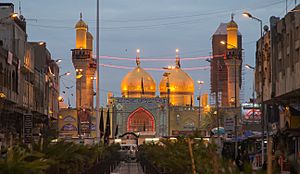Muhammad al-Jawad facts for kids
Quick facts for kids
Muhammad al-Jawad
مُحَمَّد ٱلْجوَّاد |
|
|---|---|

Arabic text with the name of Muhammad ibn Ali and one of his titles, "Al-Jawad"
|
|
| Born | c. 12 April 811 CE (10 Rajab 195 AH) |
| Died | c. 29 November 835 (aged 24) (29 Dhul Qa`dah 220 AH) |
| Cause of death | Poisoning, by Al-Mu'tasim according to most Shi'a Muslims. |
| Resting place | Al-Kadhimiya Mosque, Baghdad, Iraq |
| Other names | Muhammad al-Taqi |
| Title | |
| Term | 819 – 835 CE |
| Predecessor | Ali al-Ridha |
| Successor | Ali al-Hadi |
| Spouse(s) | Sumānah |
| Children | Ali al-Hadi Musa al-Mubarraqa Hakimah Khātūn |
| Parent(s) | Ali al-Ridha |
| Part of a series on Shia Islam |
| Twelvers |
|---|
|
Principles
|
|
Other beliefs
|
|
Other practices
|
|
Groups
|
|
Other related sects & groups
|
|
Hadith collections
|
|
|
Related topics
|
Muhammad ibn Ali al-Jawad (born around April 12, 811 – died November 29, 835) was a very important leader in Shia Islam. He was the ninth of the Twelve Imams, following his father Ali al-Ridha and before his son Ali al-Hadi. People knew him as al-Jawad ("the generous") and al-Taqi ("the pious"). He was also called Abu Jaʿfar al-Thani (the second Abu Ja'far) and Ibn al-Ridha ("the son of al-Ridha"). His mother, Sabika (also known as Khayzaran), was from Nubia.
Muhammad al-Jawad was only about four years old when his father, Ali al-Ridha, was called to Khorasan by the Caliph al-Ma'mun. The Caliph wanted Ali al-Ridha to become his successor. Shia followers wondered if such a young child could become an Imam if something happened to his father. Ali al-Ridha reminded them of Jesus, who, according to the Quran, became a prophet at a very young age.
After his father's death, Caliph al-Ma'mun called al-Jawad to Baghdad. Al-Ma'mun gave his daughter, Umm al-Fadl, to al-Jawad in marriage. He said he wanted to be a grandfather in the family line of the Prophet Muhammad. However, al-Jawad's next Imam son was born from a slave girl named Samanah. Umm al-Fadl had no children with al-Jawad. She often complained to her father that al-Jawad spent time with other women. Al-Ma'mun did not bother al-Jawad and even let him return to Medina. But the next Caliph, Al-Mu'tasim, called al-Jawad back to Baghdad. Al-Jawad left his son, Ali al-Hadi, in Medina and went to Baghdad. He lived there for less than a year. Al-Jawad died at the age of 25, which was the shortest life among the Shia Imams. Many sources say he was poisoned by his wife, Umm al-Fadl, at the request of al-Mu'tasim. He was buried next to his grandfather, Musa al-Kadhim, in a place that later became known as Kadhimiya.
Many people, both Shia and Abbasids, had doubts about al-Jawad becoming an Imam at such a young age. The Abbasids were worried about Caliph al-Ma'mun's support for the family of Ali. They tried to trick al-Jawad by having a judge ask him difficult questions. But al-Jawad answered all the questions perfectly. Shia followers from all over the Islamic world were also very impressed by his knowledge. This helped to remove their doubts about him.
Contents
Names and Titles
Muhammad al-Jawad was often called al-Jawad, meaning "the Generous." Sometimes he was called al-Taqi, meaning "the Pious." Shia scholars often referred to him as Abu Jaʿfar al-Thani, which means "the second Abu Ja'far." He was also known as Ibn al-Ridha, meaning "the son of Ali al-Ridha," because he was his father's only child.
Historians describe al-Jawad as very generous, which is why he earned the name al-Jawad. He was also known by other names like al-Qani (the satisfied) and al-Murtadha (one who is satisfied).
Early Life and Imamate
Birth and Childhood
Muhammad al-Jawad was born in June 811 CE in a village near Medina called Surayya. His grandfather, Musa al-Kadhim, had founded this village. Today, many Shia Muslims celebrate his birthday on the tenth of Rajab, which is April 8.
When al-Jawad was four years old, his father, Ali al-Ridha, was called by the Abbasid Caliph al-Ma'mun. The Caliph wanted Ali al-Ridha to be his successor. Ali al-Ridha left young al-Jawad in Medina. Shia followers wondered if a child so young could become an Imam. Ali al-Ridha would tell them the story of Jesus, who became a prophet at an even younger age.
After His Father's Death
After Ali al-Ridha died, Caliph al-Ma'mun returned to Baghdad. Many Shia Muslims believed that al-Ma'mun was involved in Ali al-Ridha's death. Even though al-Ma'mun changed some of his policies, he continued to show favor towards the Shia family.
Later, al-Ma'mun ordered al-Jawad to come to Baghdad. He then arranged for al-Jawad to marry his daughter, Umm al-Fadl. This decision made many Abbasid leaders unhappy. They were worried about al-Ma'mun's support for the family of Ali. Al-Ma'mun gave al-Jawad a large sum of money and said he wanted to be a grandfather in the Prophet Muhammad's family line. Al-Jawad often visited al-Ma'mun's palace and had discussions with learned men there.
Marriage and Family
Al-Jawad's marriage to Umm al-Fadl, Caliph al-Ma'mun's daughter, was arranged when al-Jawad was still a child. The actual wedding ceremony took place later, in 830 CE, when al-Ma'mun called al-Jawad from Medina to Baghdad. He asked al-Jawad and his new wife to live in the city.
This marriage was not popular with the Abbasid leaders. They tried to convince al-Ma'mun to change his mind. They even arranged for Yahya ibn Aktham, a chief judge, to ask al-Jawad difficult questions about religious law. They hoped to embarrass him. However, al-Jawad answered all the questions perfectly. Shia Muslims see this as a sign of his amazing knowledge.
About a year after his marriage, al-Jawad went on the Hajj pilgrimage with his family. Then he moved to Medina. His son, Ali al-Hadi, who would become the next Shia Imam, was born there. Ali al-Hadi's mother was a slave girl named Samaneh, from the Maghreb region. Umm al-Fadl had no children. She complained to her father that al-Jawad preferred his slave girl to her. However, al-Ma'mun did not agree with her complaint.
His Passing
After Caliph al-Ma'mun died in 833 CE, his brother, Al-Mu'tasim, became the new Caliph. Al-Mu'tasim called al-Jawad to Baghdad in 835 CE. Al-Jawad left his son Ali al-Hadi and his mother Sumaneh in Medina. His wife, Umm al-Fadl, went with him to Baghdad. They lived there for about a year. According to some sources, al-Jawad's wife poisoned him at the urging of Caliph al-Mu'tasim.
Al-Jawad died at the age of 25, which was the shortest life among the Shia Imams. He was buried next to his grandfather, Musa al-Kadhim, in a place that became known as al-Kazimayn Shrine.
Leadership as Imam
Al-Jawad was only seven years old when his father died. This made him the first Imam who was still a child. Many Shia followers wondered if someone so young could be an Imam. They debated whether an Imam needed to be an adult.
Eighty of his father's followers met in Baghdad. They argued that al-Jawad was the true Imam. They said that an Imam's knowledge does not depend on age. They used the example of Jesus, who spoke as a baby and received divine messages while still a child. They believed that a child Imam could be just as wise as an adult Imam because their knowledge came from divine sources.
It is also said that during the Hajj pilgrimage, important Shia leaders from all over the Islamic world came to see the young Imam. They were so impressed by him that their doubts disappeared. One story says that the leader of the Shrine gave al-Jawad a test that lasted for several days. Al-Jawad answered thirty thousand questions, amazing everyone!
Challenges and Supporters
When al-Jawad became Imam, the Shia population had grown very large and spread far to the east. It was hard for al-Jawad to communicate directly with all his followers. Because he was so young, he often communicated through special representatives called Wakils. These Wakils managed the daily affairs of the Shia communities in different areas. Al-Jawad also sent letters to his followers, answering their questions about Islamic law, such as marriage, divorce, and inheritance.
Some of his important companions and representatives included Uthman ibn Sa'id al-Asadi, Al-Fadl ibn Shadhan, Zakariya ibn Adam, and Ali ibn Mahziar Ahvazi.
Family Life
Umm al-Fadl, the daughter of Al-Ma'mun, was al-Jawad's first wife. They did not have any children together. Samaneh, a slave girl from the Maghreb region, was the mother of al-Jawad's children.
Al-Jawad had two sons with Samaneh: Ali al-Hadi and Musa. He also had several daughters. Different historians have listed their names differently. Some say he had two daughters, Fatemeh and Imamah. Others say he had three: Khadija, Hakimah, and Umm Kulthum. Some sources add two more names, Bahjat and Bariha.
Character and Wisdom
Muhammad al-Jawad was known for his kind and generous nature. Some descriptions say he had a white face and was of average height. Other sources say he had darker skin. His darker skin was one reason why some Abbasid leaders did not want him to marry al-Ma'mun's daughter.
The symbol on his ring, which he also used as his seal, was "Glory is to Allah."
As a young child, Muhammad al-Jawad earned the name al-Jawad ("the generous"). When his father was away, people would gather at al-Jawad's house, hoping for help. His caregivers sometimes tried to have him leave through another exit to avoid the crowds. But when his father heard about this, he wrote a letter to his son. He advised al-Jawad not to listen to those who told him to avoid the main gate. His father wrote that such advice came from being stingy and afraid that others might receive good things from al-Jawad. He told his son: "Whenever you want to go out, keep some gold and silver with you. No one should ask you for anything without your giving it to him." He also told him to be generous to his relatives.
Showing His Knowledge
During his eight years in Baghdad, al-Jawad spent time teaching. Some of his wise sayings were written down.
One famous story tells of a debate with Yahya ibn Aktham, the Chief Justice of the Abbasid Empire. This happened in front of Caliph al-Ma'mun. Yahya ibn Aktham tried to test al-Jawad by asking a difficult question about religious law. He asked about the punishment for a person who hunts an animal while wearing special clothes for pilgrimage (Ihram).
Al-Jawad did not answer directly. Instead, he asked many questions back: "Was the animal killed inside or outside the holy area? Did the hunter know it was wrong, or did he do it by mistake? Was the hunter a slave or a free man? Was he an adult or a child? Was it his first time doing this sin, or had he done it before? Was the animal a bird or something else? Was it small or big? Is the hunter sorry for what he did, or does he not care? Did he kill it secretly at night or openly during the day? Was he on pilgrimage for Hajj or Umrah?" This detailed response amazed everyone, especially those who had criticized al-Ma'mun's choice of al-Jawad.
Al-Jawad's letters to his followers have been collected in different Shia books. These letters answered many questions about Islamic law. He also shared many sayings (Hadiths) from the Prophet Muhammad and previous Imams.
Different Views
Sunni Perspective
According to some Sunni scholars, al-Jawad was one of the important leaders from the Prophet's family. They described him as a notable member of the Hashemites (the Prophet's clan) who was famous for his generosity. One scholar said that al-Jawad "followed the footsteps of his father in knowledge, piety, and generosity."
Shia Perspective
Shia sources show great respect for al-Jawad. It is said that his father, Ali al-Ridha, would address his son as Abu Ja'far out of respect. Al-Jawad was also praised for his clear and fluent letters.
There is a story about Ali ibn Ja'far, an important religious scholar and al-Jawad's great-uncle. One day, while Ali ibn Ja'far was sitting with his companions, young al-Jawad came into the Mosque. Ali ibn Ja'far immediately stood up and kissed al-Jawad's hand. Al-Jawad asked him to sit, but Ali ibn Ja'far refused to sit while al-Jawad was standing. Later, his companions asked him why he showed such respect to a child, especially since he was the child's great-uncle. Ali ibn Ja'far replied, "Keep silent! It is Allah Who has not given this beard (pointing to his own beard) the position of Imamate, but He has given it to this young man. We seek Allah's protection from what you say." This shows the deep respect for al-Jawad's special position.
Amazing Stories
Many stories describe amazing events connected to al-Jawad, similar to those told about other Imams. These stories show his special connection to God. For example, some stories say he could make a tree bear fruit, predict that a slave girl would have a son, or even bring a cow back to life for an old woman. Another story says his walking stick spoke to confirm he was the true Imam when Yahya ibn Aktham asked for proof.
One famous story tells of Caliph al-Ma'mun's first meeting with al-Jawad. Al-Ma'mun was hunting and saw a group of boys playing, including al-Jawad. When al-Ma'mun's horsemen approached, all the boys ran away except al-Jawad. Al-Ma'mun stopped and asked, "Boy, why didn't you run away with the others?" Al-Jawad calmly replied, "The road was wide enough for you to pass, and I haven't done anything wrong to be afraid. I believe you are the kind of man who would not harm someone who has done no wrong."
Shia traditions say the Caliph was very pleased. After riding a short distance, one of his hunting birds caught a small fish. Al-Ma'mun hid the fish in his hand, returned, and asked al-Jawad: "What do I have in my hand?" Al-Jawad immediately answered: "The Creator of living things has created a small fish in the sea. It is caught by the falcons of kings and caliphs to test the descendants of Muhammad." Al-Ma'mun was very happy with this answer. He then asked the child about his family. Soon after, the Caliph held a large meeting where al-Jawad was asked many questions. He amazed everyone with his wise answers and deep knowledge. After this, al-Ma'mun formally gave al-Jawad his daughter in marriage.
Images for kids
Error: no page names specified (help). In Spanish: Muhammad al-Yawad para niños
In Spanish: Muhammad al-Yawad para niños
 | Roy Wilkins |
 | John Lewis |
 | Linda Carol Brown |




